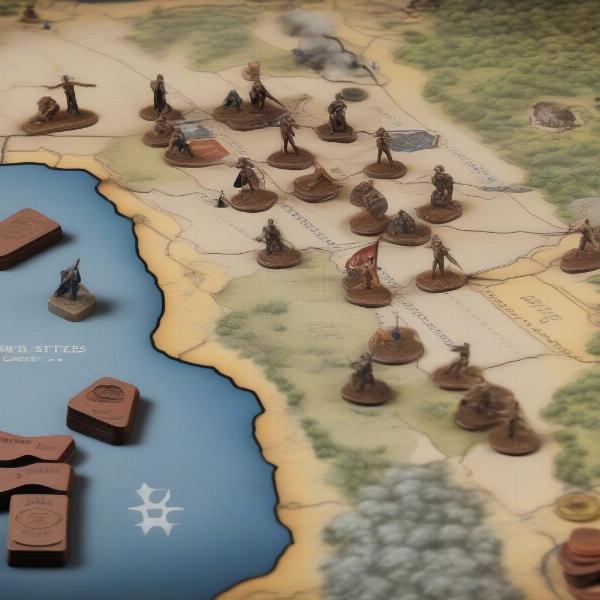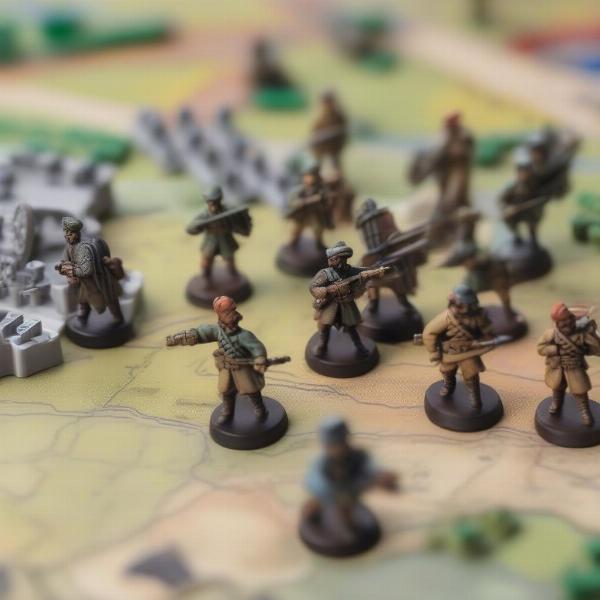The American Civil War, a pivotal moment in United States history, continues to fascinate and inspire. At SupremeDuelist.blog, we’re passionate about exploring history through the engaging medium of board games, and today, we’ll be diving deep into the world of Us Civil War Board Games. This article will explore what makes these games compelling, the different types available, and help you choose the perfect one for your gaming table.
This conflict, marked by its intense battles and political upheaval, offers a rich landscape for strategic and narrative-driven gameplay. Whether you’re a seasoned wargamer or a history enthusiast looking for an interactive way to learn, there’s a US Civil War board game waiting to immerse you in this crucial era.
Why Play US Civil War Board Games?
US Civil War board games are more than just entertainment; they are immersive experiences that allow players to engage with history on a deeper level. Unlike reading a textbook, these games require strategic thinking, planning, and a good understanding of the era’s challenges.
Historical Immersion
Playing a board game about the US Civil War allows you to step into the shoes of historical figures and make the strategic decisions that shaped the outcome of the conflict. This direct engagement provides a more personal and meaningful way to learn about the war than passively reading about it. You get to see the impact of your choices on the battlefield, and on the overall trajectory of the war. This immersive approach helps you grasp the complexities of the era, from the military strategies to the political landscape, in a way that’s both educational and exciting.
Strategic Gameplay
Many US Civil War games are built on robust strategic frameworks, requiring players to manage resources, command troops, and consider the broader political and economic landscape. It’s not just about rolling dice; it’s about thinking several steps ahead, understanding supply lines, and making calculated risks. This strategic depth makes these games engaging for both seasoned wargamers and newcomers to the genre. The strategic layer often involves maneuvering forces, managing morale, and even navigating the political tensions that influenced the conflict.
Replayability and Variety
There’s a diverse array of US Civil War board games available, each offering unique mechanics, levels of complexity, and focus. Whether you prefer grand strategy games that encompass the entire war or more tactical engagements focusing on specific battles, there is a game to meet your preferences. The variety ensures high replayability, as each game unfolds differently depending on the strategic choices made by the players. Additionally, many games incorporate historical scenarios, allowing you to explore different facets of the war and test different strategic approaches.
 Civil War Board Game Strategic Map
Civil War Board Game Strategic Map
Types of US Civil War Board Games
The world of US Civil War board games is diverse, with titles catering to a wide range of preferences and experience levels. Here are some common types you’ll encounter.
Grand Strategy Games
These are large-scale games that simulate the entire war, focusing on the big picture, with an emphasis on resource management, political strategy, and overall campaign planning. They often involve multiple players and can take several hours, or even days, to complete a full campaign. Games like Victory or Death, which encompasses the entirety of the civil war with an operational focus, fall into this category. Grand strategy games are perfect for those who love detailed planning and long-term strategic thinking. They often involve intricate supply lines, complex economic considerations, and political maneuverings. If you are interested in games that offer deep strategic experiences and allow you to impact the entire war effort, then this type is for you.
Tactical Battle Games
These games focus on smaller scale engagements, typically simulating specific battles or skirmishes within the war. They are often more focused on the specifics of combat, such as unit positioning, terrain advantages, and the use of different weapons. This kind of game is designed for those who prefer hands-on tactical gameplay, where unit-by-unit maneuvers can shift the momentum of battle. You’ll often find detailed maps with carefully crafted terrain features influencing battle outcomes. For example, games that zoom into the details of the Battle of Gettysburg fall under this genre. If you find the finer details of battlefield tactics more interesting, these games are worth considering.
Card-Driven Games (CDGs)
Card-driven games are known for integrating historical events and command orders using a deck of cards. The cards introduce narrative elements, strategic options, and a level of unpredictability, forcing players to constantly adapt to new challenges. CDGs often blend tactical and strategic elements, creating a compelling historical narrative as the game unfolds. These games utilize historical events and command choices through the utilization of a deck of cards, making each playthrough different. If you value narrative storytelling and dynamic gameplay experiences, then CDGs will be quite appealing.
Block Games
Block wargames obscure the strength of your forces by using blocks that are hidden from your opponent. This system creates a fog of war, mirroring the uncertainty of real combat. The game emphasizes hidden movements and planning, adding a unique strategic element. This style of game is perfect for players who enjoy the element of surprise and want to have a sense of not knowing what their opponent is planning. If you appreciate games with hidden information and strategic surprises, block games are definitely something to explore. Many wargamers find the hidden information element extremely compelling.
“The beauty of US Civil War board games lies in their ability to transport players back in time and challenge them to grapple with the complexities of warfare and historical decision-making,” says Dr. Amelia Hayes, a historian specializing in 19th-century American warfare. “These games are not just for fun; they are a unique way to learn history.”
Key Features to Consider When Choosing a Game
With so many options available, choosing the right US Civil War board game can feel daunting. Here are some essential factors to consider:
Complexity Level
How complex are the rules and gameplay? Some games are relatively simple and easy to pick up, while others feature intricate rules and numerous moving parts. It’s important to choose a game that matches your experience level and preferred level of challenge. For beginners, starting with simpler titles is advisable to avoid being overwhelmed by the rules. For experienced wargamers, complex games offer a more engaging strategic experience.
Playing Time
How long does it typically take to play a full game? This can range from a few hours for smaller tactical games to several days for grand strategy games that cover the entirety of the war. Consider how much time you have available and how long you’re comfortable playing a single game. If you only have an evening available, consider looking at tactical games or shorter card-driven options. If you enjoy longer, more involved gaming sessions, consider some of the grand strategy titles.
Player Count
How many players does the game accommodate? Some are designed for two players, while others can accommodate multiple players. Consider the number of players you typically have in your gaming group. If you play frequently with one other person, a two player game might be ideal. However, if your gaming group is larger, make sure to choose a game that can accommodate everyone. Some games also offer solitaire rules, allowing a single player to challenge themselves.
Historical Accuracy
How much attention to historical accuracy does the game have? Some games strive for rigorous historical detail, while others take a more stylized and abstracted approach. Decide what level of historical accuracy you’re seeking from your gaming experience. If strict historical accuracy is your goal, then look into titles with detailed research and historical documentation. However, if you prefer a more engaging gameplay that might take some liberties with history, then look at some other options.
Components and Art Style
Do you like the components and art style of the game? A visually appealing game with high-quality components can greatly enhance the overall gaming experience. Components like detailed miniatures, beautifully illustrated maps, and well-written game manuals add a tactile and visual element that make the game more enjoyable to interact with. Do the artwork and style appeal to your sensibilities, or would you prefer a more minimalist design? These kinds of considerations will make choosing the right game much easier.
 Civil War Game Pieces
Civil War Game Pieces
Top US Civil War Board Game Recommendations
While the best game always depends on personal preference, here are some recommendations for those seeking an exciting and engaging Civil War experience:
- For the Grand Strategist: For The People, a card driven game focusing on the entirety of the war with a mix of strategic, political, and economic gameplay. Games such as war in the pacific board game offer similar high-level campaign planning but on a global scale.
- For the Tactical Mind: Gettysburg, a classic tactical game with excellent focus on the minute details of battlefield combat.
- For a Card-Driven Experience: Twilight Struggle, while not strictly a US Civil War game, its implementation of card-driven gameplay mechanics is highly applicable to the design of many Civil War titles, and is a must-play for understanding the core mechanics.
- For the Beginner: Civil War, a good introductory game that uses simple rules and game concepts for quick games, teaching newcomers the basics of wargaming within this setting.
“When choosing a game, consider what aspect of the Civil War you find most engaging,” says James Miller, a board game enthusiast with years of experience in historical wargames. “Are you interested in the grand strategy of the war, the tactical combat of specific battles, or the political machinations that shaped the conflict? Your preference will guide you to the best fit.”
If you’re keen on exploring other historical conflicts, you might find our article on buy this war of mine board game equally engaging, though that game takes a completely different approach to war.
How to Get Started with US Civil War Board Games
If you’re new to US Civil War board games, here are a few tips to help you get started:
-
Start Simple: Don’t jump straight into the most complex games. Begin with an introductory game to learn the basics of the genre.
-
Read the Rules: Always read the rulebook carefully before playing. Take your time to understand all the rules and make notes as needed.
-
Watch Tutorials: If the game has tutorial videos, watch them, as they are a great way to learn the rules visually.
-
Join a Community: Connecting with other board game players through online forums or local groups can help enhance your gaming experience.
If you’re eager to explore other conflicts on the tabletop, consider checking out our review of army men world war game, which offers a different style of war experience.
-
Be Patient: It might take a few games to fully grasp the mechanics, strategies, and nuances of a game. Don’t get discouraged if you don’t do well on your first few attempts.
Conclusion
US Civil War board games offer a unique and engaging way to explore one of the most significant periods in American history. Whether you’re a history buff, a strategy game enthusiast, or simply looking for a new and exciting gaming experience, there’s a game out there that’s sure to captivate you. At SupremeDuelist.blog, we’re committed to bringing you the best in gaming content, and we hope this guide has helped you navigate the rich landscape of US Civil War board games. Now, gather your friends, study your strategies, and prepare to immerse yourself in the fascinating world of the American Civil War on your tabletop. Why not delve into the history and strategy of a different conflict? Our article on how much is cold war on xbox with game pass might offer a modern counterpoint to this historical struggle.
Leave a Reply